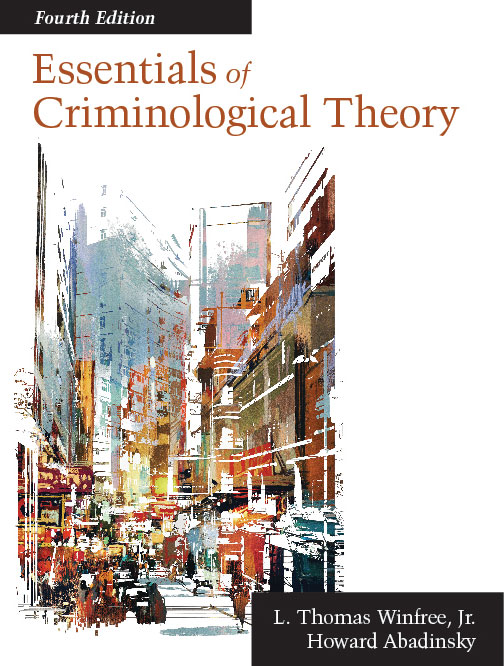"Well priced and sized for the undergrad learner, this text is an asset to the teaching of criminological theory and has the additional benefit of being a valuable reference." — Cortney Dalton, Washington State University, Pullman
"Essentials of Criminological Theory, 4/E is an example of a leading criminological theory text, exhibiting the perspectives of the top theorists in the field. Its organization rivals its content, done in a fashion promoting an incrementally developed and easy-to-understand format. A concise and complete treatment. Simply first-rate." — David Keys, New Mexico State University

250 pages, $46.95 list
1-4786-3292-5
978-1-4786-3292-4
© 2017
paperback
Instructor's resource materials available here
To obtain a username and password to access these materials, contact comps@waveland.com.
To obtain a username and password to access these materials, contact comps@waveland.com.
eBook availability
Similar Titles
Essentials of Criminological Theory
Fourth Edition
This concise textbook introduces students to multidisciplinary theories about why people commit crime. Winfree and Abadinsky strive to make the study of crime and justice as clear, succinct, current, and consumable as possible. Tracing the evolution of theories and their influence on research today, the authors provide a solid foundation for students to understand the role theory plays in criminal justice practices.
The first nine chapters explore various types of theories, providing the historical context and the basic assumptions each theory makes about human behavior, the causal arguments, and what criminologists have learned from testing the theories. The theory as originally proposed may have gone through a metamorphosis. Change is an important—and exciting—aspect of crime theory. Ideas that attempt to describe, explain, predict, and possibly control a specific behavior sometimes remain as originally conceived and sometimes evolve to something quite different. The final chapter explores the ways the various theories influence criminal justice policy, focusing on law enforcement.
To help readers assimilate and synthesize the essentials of criminological theory, each chapter contains learning objectives, boxed material to stimulate critical thinking, bulleted summary points, key terms, and critical review questions. There are marginal notes throughout the text to highlight concepts, as well as a comprehensive glossary for easy review of important terms.
The first nine chapters explore various types of theories, providing the historical context and the basic assumptions each theory makes about human behavior, the causal arguments, and what criminologists have learned from testing the theories. The theory as originally proposed may have gone through a metamorphosis. Change is an important—and exciting—aspect of crime theory. Ideas that attempt to describe, explain, predict, and possibly control a specific behavior sometimes remain as originally conceived and sometimes evolve to something quite different. The final chapter explores the ways the various theories influence criminal justice policy, focusing on law enforcement.
To help readers assimilate and synthesize the essentials of criminological theory, each chapter contains learning objectives, boxed material to stimulate critical thinking, bulleted summary points, key terms, and critical review questions. There are marginal notes throughout the text to highlight concepts, as well as a comprehensive glossary for easy review of important terms.
Reactions
1. An Introduction to Criminological Theory
Introduction / What Is a Crime? Who Is a Criminal? / Classifying Crimes / What Is Theory? Why Is It Important? / The Significance of Nature and Nurture for Crime Theories / On the Roots of Theory
2. Classical Criminology and Deterrence Theories
Introduction / Classical Deterrence Theory / Deterrence Rediscovered / Deterrence Theorizing in the Twenty-First Century
3. Biological Theories
Introduction / Criminal Anthropology / Genetics and Crime / Crime and the Central Nervous System
4. Theories of Psychological Abnormality
Introduction / Psychoanalytic Theory / Psychopathic Personality Theories
5. Intelligence, Learning, and Developmental Theories
Introduction / Intelligence and Crime / Behaviorism and Learning Theory / Developmental and Life-Course Criminology
6. Structural Theories
Introduction / Crime and Social Ecology / Crime and Social Structure
7. Social Process Theories
Introduction / Learning Theories / Control Theories
8. Labeling Theory and Reintegrative Shaming Theory
Introduction / Labeling Theory / Reintegrative Shaming Theory
9. Conflict Theories
Introduction / Origins of Conflict Theory / Economic Conflict and Crime / Social Conflict and Crime / Contemporary Conflict-Based Crime Theorizing
10. From Theory to Practice
Introduction / Crime Theories and Crime Control / Crime Theory and Criminal Justice Practice
Glossary of Terms
Introduction / What Is a Crime? Who Is a Criminal? / Classifying Crimes / What Is Theory? Why Is It Important? / The Significance of Nature and Nurture for Crime Theories / On the Roots of Theory
2. Classical Criminology and Deterrence Theories
Introduction / Classical Deterrence Theory / Deterrence Rediscovered / Deterrence Theorizing in the Twenty-First Century
3. Biological Theories
Introduction / Criminal Anthropology / Genetics and Crime / Crime and the Central Nervous System
4. Theories of Psychological Abnormality
Introduction / Psychoanalytic Theory / Psychopathic Personality Theories
5. Intelligence, Learning, and Developmental Theories
Introduction / Intelligence and Crime / Behaviorism and Learning Theory / Developmental and Life-Course Criminology
6. Structural Theories
Introduction / Crime and Social Ecology / Crime and Social Structure
7. Social Process Theories
Introduction / Learning Theories / Control Theories
8. Labeling Theory and Reintegrative Shaming Theory
Introduction / Labeling Theory / Reintegrative Shaming Theory
9. Conflict Theories
Introduction / Origins of Conflict Theory / Economic Conflict and Crime / Social Conflict and Crime / Contemporary Conflict-Based Crime Theorizing
10. From Theory to Practice
Introduction / Crime Theories and Crime Control / Crime Theory and Criminal Justice Practice
Glossary of Terms